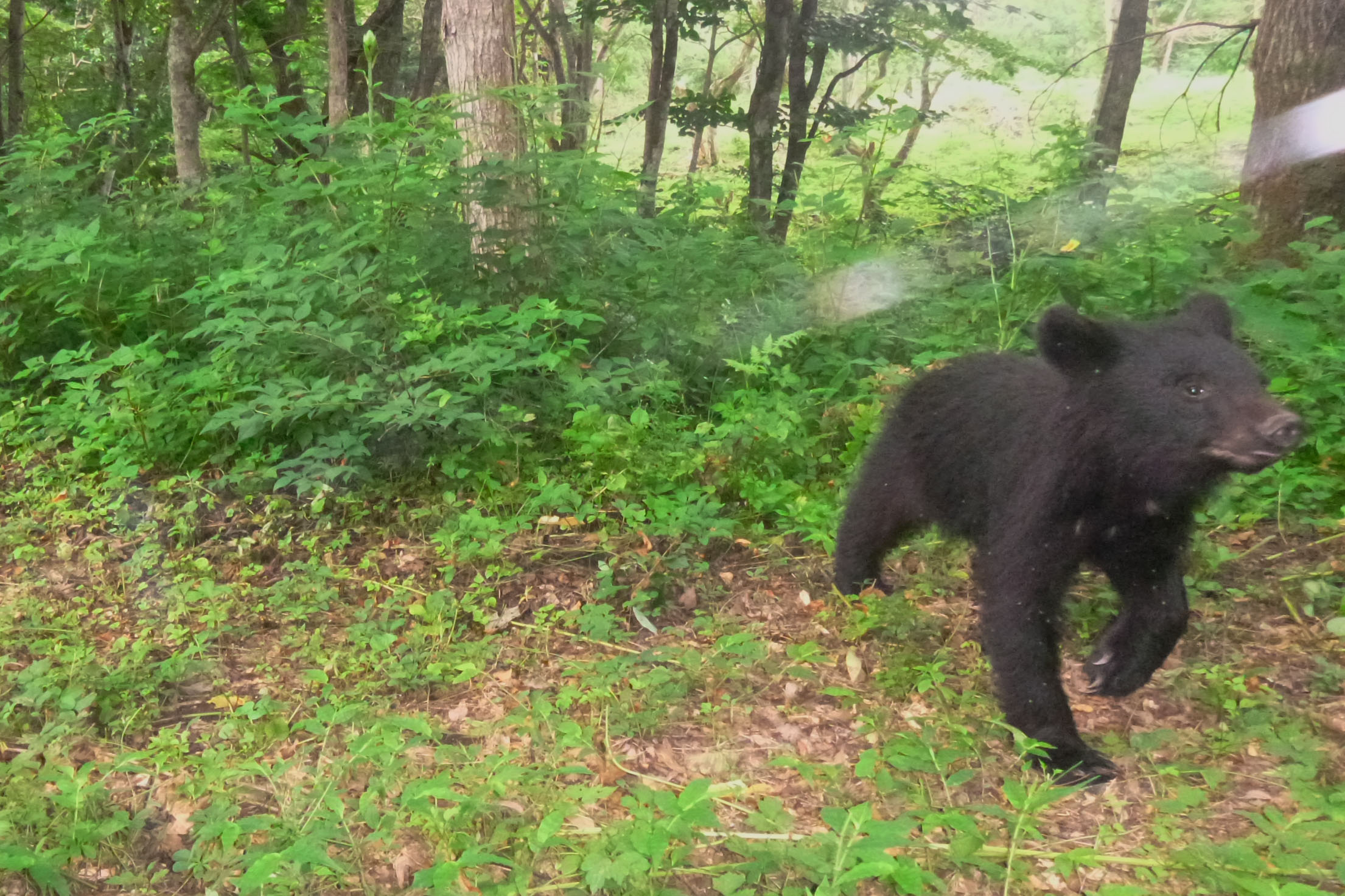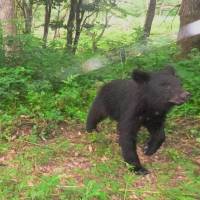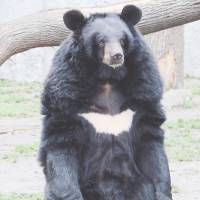When I came to live here in Kurohime in the hills of northern Nagano Prefecture almost 35 years ago, I got a gun licence and joined the local hunter's association — not because I wanted to kill things, but to help me learn about the mountains, rivers, woodlands, plants and wildlife in this area.
In those early years I'd sometimes go out with groups of hunters who were armed with a pest-extermination permit and gunning for bears. Right from the start I was unhappy about killing bears, but I did want to learn. On the many occasions that I saw them while I was with the hunters or hiking alone, the bears escaped — and in a hurry. Never once was I or anyone with me attacked.
Since 1986, I've been buying neglected wooded land close to my house to restore it to a healthy, diversified and productive state. In 2002, the adjoining parcels of property I'd acquired became a trust — the C.W. Nicol Afan Woodland Trust, to be precise — and we now host 52 endangered species of fauna and flora.
Bears are frequent visitors because our woods usually have something for them to eat. At any given time, other than in winter, there might be as many as five of them roaming and rooting and scratching and, ahem, leaving heaps of fertilizer around the place. We know this because signs of them are everywhere — tracks, claw marks, scat and so on — though we don't often see them, probably because they're wary of humans and they tend to be nocturnal.
I've generally been pretty blase about "our" bears. Though I usually carry a stick when I hike around, I've never thought to arm myself with a can of pepper spray — let alone a gun.
In the past, I've been on plenty of scientific expeditions in the Arctic, when either our group or our Inuit guides had rifles. I've also made wildlife documentaries in bear country in Canada, Alaska and the Kamchatka region of the Russian Far East, and on those occasions we carried pepper spray.
Until recently, though, I've always thought that the little black moon bears of Honshu — actually Asian black bears (Ursus thibetanus), typically about 70-100 cm at the shoulder and weighing around 135 kg with a white marking on their chests (hence the lunar label) — were pretty harmless as long as you didn't bother a mother with cubs or try to approach a cub. It's also common sense not to startle a bear, and to give any in your vicinity ample warning of your presence.
Here in Kurohime, farmers grow the sweetest corn (aka maize) I've ever tasted, and for more than 30 years bears and wild boar have been raiding the fields every year. Lately, though, their depredations have been fewer as most farmers have ringed their fields with solar-powered electric fences — but those who haven't are pretty well guaranteed to be visited when the corn is ripe in summer.
In our area, children walking to and from school carry small bells, as indeed do many adult trekkers. I don't, because I like to move as quietly as possible and see birds and other wildlife, and if I'm out at night I stick to paths and roads and ensure my stick makes a noise as it hits the ground.
However, my relaxed attitude took a knock in early August this year, when an instructor at our Afan Woodland Trust Centre — a man who really likes bears — was attacked and bitten on the arm when he went out at night to toss some garbage into his compost bin. The bear, a young one, chased him to his back door and bit him while he was getting the screen door open. He's a nice guy, and says he doesn't blame the bear — but you can be sure he won't be taking garbage out at night anymore.
In fact in the past few years there have been many reports of bear attacks in Nagano and surrounding upland prefectures, and there are lots of theories why. Bears are coming right into villages and towns, attacking people in orchards and gardens, and even at bus stops. However, what really made me sit up was a story written by Jeff Kingston in his weekly Counterpoint column in The Japan Times on Aug. 24 this year — a story headlined: "Bear attack: Up close and way too personal."
Jeff is a guy who loves and respects nature, and who has understood what most of us thought to be the basic rules for walking and hiking in bear country. Having lived in neighboring Gunma Prefecture for 20 years or so, he knows his way around. Even so, he was suddenly attacked in daytime by a bear which, without any seeming provocation, charged out of trees 10 meters away. Jeff was injured, but if his dogs had not been with him he might have been much more seriously hurt.
As I wrote in this column recently, in early summer we had a plague of gypsy-moth caterpillars around here that left many kinds of berry-, nut- and acorn-bearing trees stripped bare of leaves. In most cases, the trees regrew new leaves by August, but my observations indicate they aren't bearing much ripened fruit — which almost certainly means there will be very hungry bears around this autumn.
This, and the fact that — for whatever reason, or reasons — the bears around here don't seem to be as wary of humans as they used to be, is now a real cause for concern as our trust runs regular woodland programs for students and children.
When we started the programs 10 years ago, my forester, Mr. Matsuki, noted that some young bears were actually sleeping during the day in thickets in our woods. To encourage the growth of trees, healthy saplings, woodland flowers, wild mountain vegetables and mushrooms, we normally trim out dense growth to let the light in — but here and there we leave thickets for certain birds to nest in, and as a refuge for hares. Until 10 years ago when Mr. Matsuki noticed this phenomenon, bears would typically visit our woods at night and go back to more distant, human-free woodland during the day.
We could not risk having a bear wake up and, in a panic, attack any of our students or children, so we trimmed out most of the thickets, and we check the few remaining ones carefully before our guests come to make sure there are no bears snoozing within.
Nowadays, since we've had motion-sensitive cameras in position all over the woods, we regularly record the nocturnal presence of bears, wild boar, deer, racoon dogs, badgers, foxes, martens, hares and even small creatures like squirrels. Recently, a young bear that was perhaps startled by the sound or flash of an automatic camera came over to inspect it — and to give it a poke and a lick. That's not happened before.
I still like bears, and I'm happy to have them around, but from now on I will definitely be more wary — while also continuing our efforts to make Japan's woodlands more diverse in nature and more suitable for wild bears to survive in.
A little while ago, for several nights running, there was a young bear rooting around in my back garden. So no, I don't dump garbage after dark — and if ever I can stop traveling around so much, I hope to keep a couple of bear-savvy dogs. Thanks for the warning, Jeff.





















With your current subscription plan you can comment on stories. However, before writing your first comment, please create a display name in the Profile section of your subscriber account page.